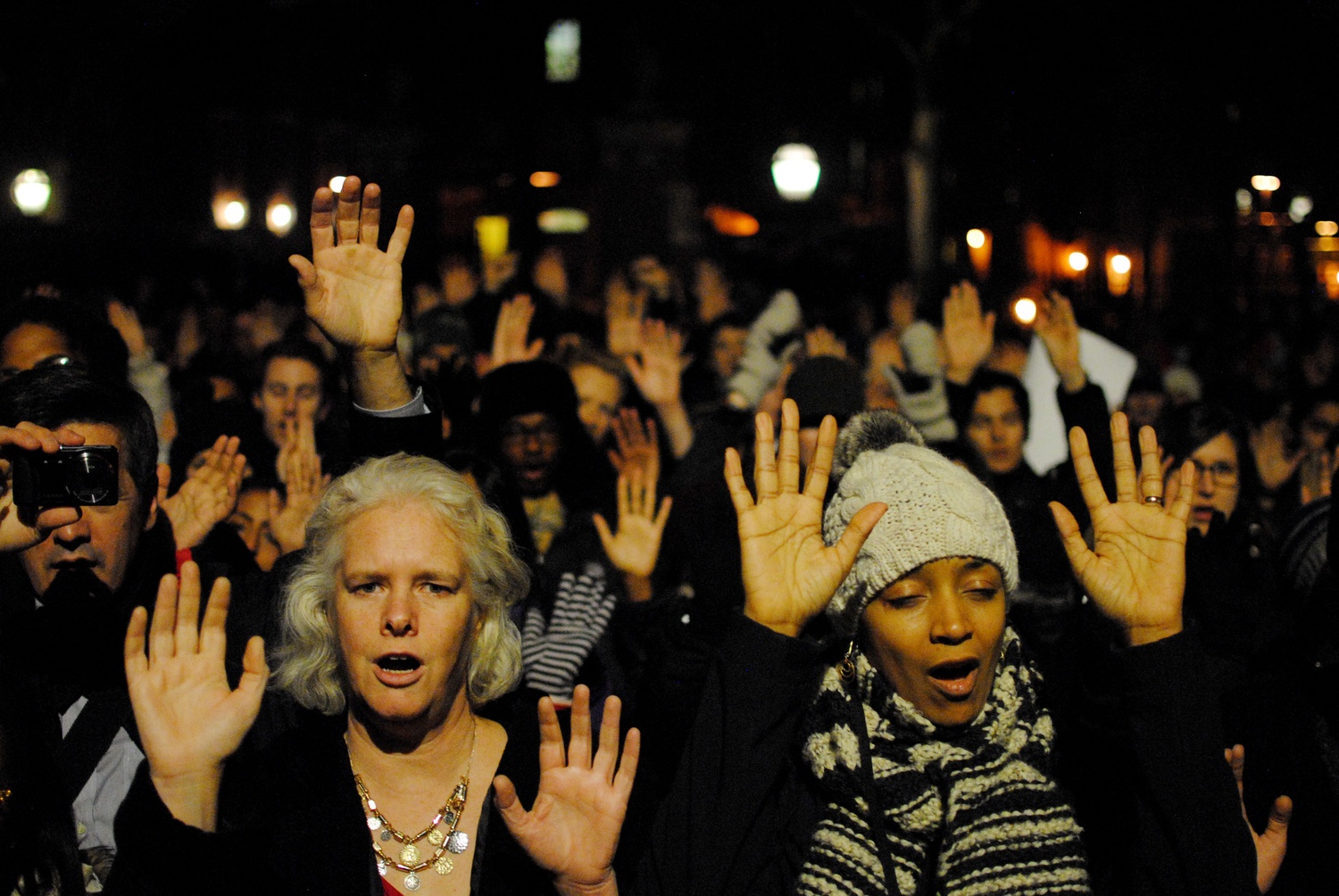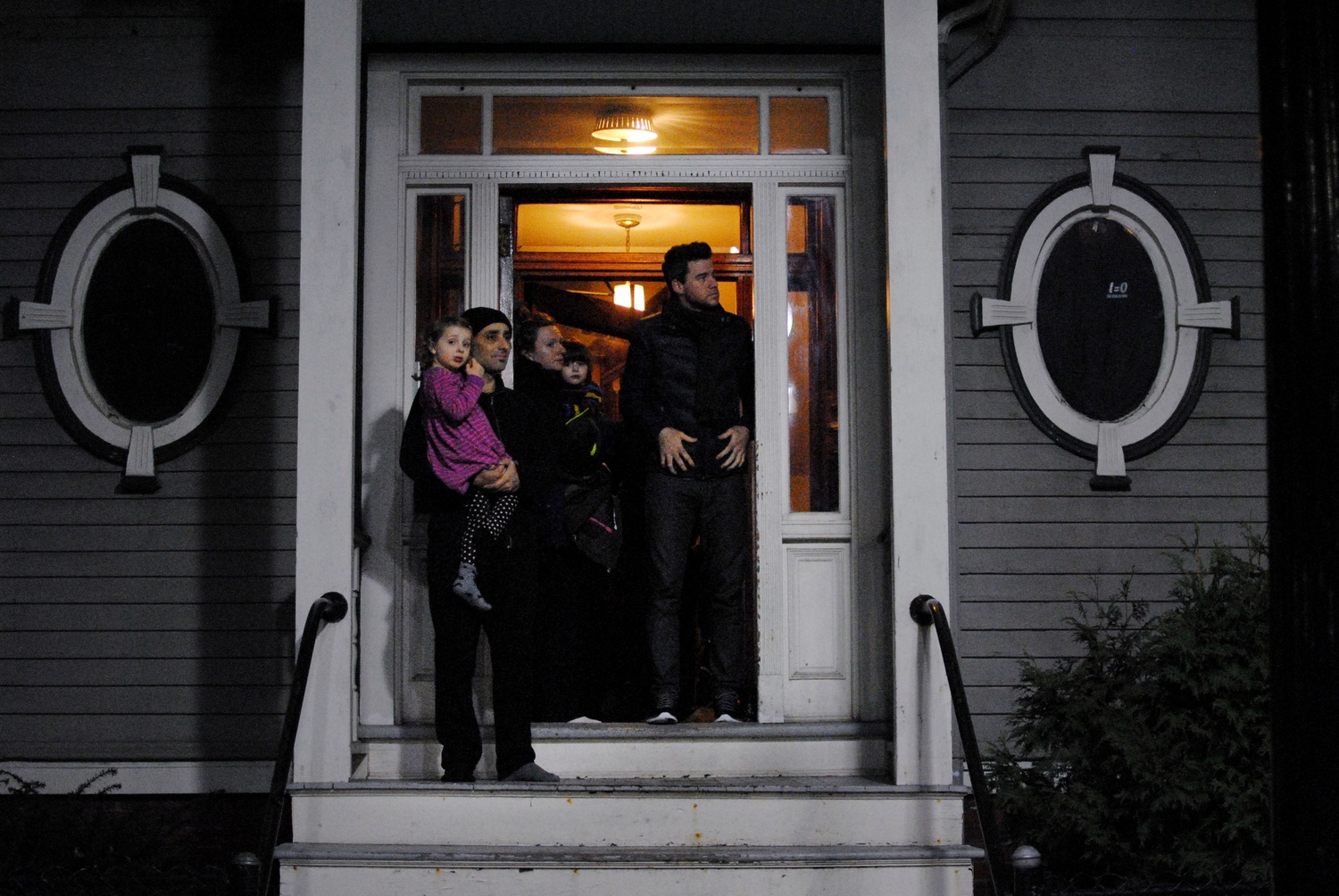
News
Summers Will Not Finish Semester of Teaching as Harvard Investigates Epstein Ties

News
Harvard College Students Report Favoring Divestment from Israel in HUA Survey

News
‘He Should Resign’: Harvard Undergrads Take Hard Line Against Summers Over Epstein Scandal

News
Harvard To Launch New Investigation Into Epstein’s Ties to Summers, Other University Affiliates

News
Harvard Students To Vote on Divestment From Israel in Inaugural HUA Election Survey
Affiliates Raise Hands, Snarl Traffic in Largest Harvard Protest Yet Following Non-Indictments

UPDATED: Dec. 12, 2014, at 9:00 p.m.
Hundreds of Harvard affiliates from across the University’s schools brought traffic in and around Harvard and Central squares to a standstill Friday evening as they marched through Cambridge streets in protest of racial prejudice in the criminal justice system.
After lying down shortly after 6 p.m. for what activists have called a “die-in” that stretched several hundred feet along Mass. Ave., protesters rose and marched from Harvard Square to Memorial Drive, continuing east to Western Ave. They turned there, marching through stopped traffic toward Central Square before ultimately returning to Harvard Square. Along the way, the protesters staged three other die-ins, halting traffic on Western Ave. as well as in Central Square and for a second time in Harvard Square.
The “March on Harvard,” as the demonstration was billed, was the latest in a series of protests on campus and around the country in recent weeks prompted by the decisions of two separate grand juries not to indict white police officers who had killed unarmed black men, Michael Brown and Eric Garner.
The Cambridge Police Department hired additional traffic and patrol officers to monitor the protest, according to an email from CPD spokesperson Jeremy Warnick. He said that no arrests were made during the nearly two and half hours demonstrators were active on campus and in Cambridge.
Dozens of Cambridge and Massachusetts state police officers were present throughout the evening, with some escorting the protesters and others stationed at a number of intersections along the route clearing their way.

Before converging upon the Square for the first die-in, protesters gathered in the Science Center Plaza at 5 p.m., where they heard from a series of speakers, including Cambridge City Councillor Leland Cheung, who addressed the crowd, intermittently joining in with chants such as “No justice, no peace,” common to similar protests that have sprung up around the country.
Before concluding the hour-long string of speeches, poetry, and songs, Victoria I. White-Mason, a Law School student who organized the demonstration, told fellow protesters to remain peaceful as their demonstration proceeded into the Square.
White-Mason also invited representatives from other Harvard schools to a stage organizers had set up, asking them to read “oaths” that vowed commitment to fighting racial inequality in their respective disciplines and professions.
As part of the series of speeches and poems, Kimiko M. Matsuda-Lawrence ’16 read a poem she wrote inspired by a protest during Primal Scream two nights before, in which protesters attempted a moment of silence during a college tradition that involves running naked around the Yard. She said that facing the “mob of angry drunk white men” that stood juxtaposed to the protesters had been the scariest instance of her time at Harvard, and accused Primal Scream participants of “running away from race” when they turned away from the protesters.

As of 5 p.m., more than 1,700 individuals had indicated that they were attending the demonstration on its Facebook page. The crowd on hand at the Science Center appeared to be significantly smaller than that estimate, though still at least several hundred people.
College Dean of Student Life Stephen Lassonde sent an email to undergraduates Friday afternoon awknoledging the demonstration, but asking participants to refrain from gathering in the Science Center Plaza before 5 p.m., when final exams concluded for the day.
Although protesters began gathering before the permitted 5 p.m. start time, they remained quiet until exams concluded.
Among the first demonstrators to arrive was Timothy C. Devine ’17, who said that although the campus movement would lessen when students left campus for the winter break, its momentum would be “spread to a thousand hometowns across the country.”
Lassonde, Dean of the College Rakesh Khurana, and other College administrators would be present for the demonstration, Lassonde said earlier Friday.

More than two hours after they began, shortly after 7 p.m., the protesters returned to Harvard Square, where they staged the final die-in along Mass. Ave. in front of the Smith Campus Center.
After the die-in, one of the march’s organizers asked the protestors to sit where they were.
“Thank you all for inviting yourselves. Look to the left and right. Tell your neighbor, ‘Welcome to the movement.’ This is the moment. Don’t wait. Tell them you won’t stop until you see justice. This is our Selma,” she said.
—Check TheCrimson.com and follow @thecrimson on Twitter for updates.
—Staff writers Jalin P. Cunningham, Noah J. Delwiche, Mariel A. Klein, and Kamara A. Swaby contributed to the reporting of this story.
—Staff writer Michael V. Rothberg can be reached at mrothberg@college.harvard.edu. Follow him on Twitter @mvrothberg.
—Staff writer Steven R. Watros can be reached at steven.watros@thecrimson.com. Follow him on Twitter @SteveWatros.
Want to keep up with breaking news? Subscribe to our email newsletter.
